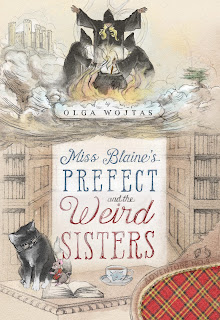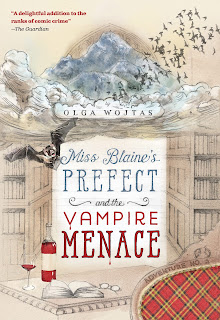A time-traveling Scottish librarian with a chip on her shoulder because the school she proudly attended (the Marcia Blaine School for Girls) was panned in The Prime of Miss Jean Brodie and a feminist philosophy that she does her best to inflict on a past where it is very much unwelcome—who could resist such a heroine? Certainly not me. Olga Wojtas’s tongue-in-cheek approach to history—a trait she shares with her main character, Shona McMonagle—makes a nice change from the more serious historical fiction that so often crosses my path. I have yet to read the second novel, Miss Blaine’s Prefect and the Vampire Menace, but I have read the first and the third.
Miss Blaine’s Prefect and the Golden Samovar (book 1) takes place in the Russian Empire on a date that is never specified but can be deduced from clues in the text. Shona knows she has a mission, but not what it is, and much of the action involves her swanning about St. Petersburg high society trying to figure it out before her assigned week ends and she is summoned back to contemporary Edinburgh in disgrace. It’s all very lighthearted, especially the contrast between Shona’s view of her own near-omnipotence and the reality that lies right under her nose.
Book 3, Miss Blaine’s Prefect and the Weird Sisters, has just come out. For this one, Shona remains in Scotland but travels far into the past, where she encounters Macbeth. Yes, that Macbeth. Also Lady Macbeth, King Duncan, the three witches—I could go on, but you get the idea. There’s even a cat with three names, in an unspoken but, I assume, not unintended nod to T.S. Eliot. To celebrate her latest publication, Olga Wojtas agreed to answer my written questions, so read on to find out more about Shona and her various missions.
This is the third novel featuring your time-traveling librarian, Shona McMonagle. What was your inspiration for this series?
I’m a journalist and a news junkie and was getting stressed out by current events, so I decided to write a comic romp where the reader could relax knowing that everything would work out and there was no jeopardy. Normally there’s character development in novels, with the protagonist going on a literal or metaphorical journey. I don’t have anything like that—my heroine is exactly the same at the end of her missions as at the beginning and has learned nothing. A great influence was P. G. Wodehouse’s Jeeves and Wooster books, where Bertie constantly gets into terrible scrapes and has to be bailed out by Jeeves.
Shona goes first to tsarist Russia and then to fin-de-siècle France. How do you pick your settings?
I studied Russian and developed a love of its literature, especially Tolstoy. That was the inspiration for the first novel because I could steal some scenes: the grand ball; the duel in the forest; the drama involving a train. The second novel was inspired by the time I lived in Grenoble in France, which is in a valley surrounded by mountains. It had a vampire theme, and I imagined a French village surrounded by mountains so high that the sun never reached it. There’s a vampiric link with Aberdeenshire in Scotland, which led me to introduce a real person, the Scottish-American opera star Mary Garden. She became Debussy’s muse in Paris at the beginning of the twentieth century, which suggested the time period.
Before we get to the current novel, tell us a bit about the Marcia Blaine School for Girls and its proprietor. And how does The Prime of Miss Jean Brodie get in there?
The Marcia Blaine School for Girls is where Miss Brodie teaches in Muriel Spark’s novel, The Prime of Miss Jean Brodie. It was based on James Gillespie’s High School in Edinburgh, Scotland, the school Dame Muriel attended and where I went as well. I’ve fictionalized the school even further, giving it the motto Cremor cremoris, the crème de la crème. My heroine, Shona, is appalled by Dame Muriel’s novel, which she believes has brought the school into disrepute. A librarian in Edinburgh’s Morningside Library, she spends her time preventing the book falling into the hands of readers. One day the school’s founder, Miss Blaine herself (who Shona calculates must be over two hundred years old but appears to be a woman in her prime, like Miss Brodie) turns up in the library, and Shona finds herself sent on a time-traveling mission. The aim of every Blainer is to make the world a better place, and time traveling means they can make previous worlds better as well.
From the title of this novel, it’s pretty clear that Shona will meet Macbeth and the three witches. What is her mission, to the extent that she knows herself?
It has to be said that Shona rarely, if ever, has a proper grasp of what her mission is. She occasionally muses that it would be easier if there were written instructions, but this usually results in a pain in her big toe as though someone has trodden on it very hard, so she tries not to complain too audibly. In this instance, she knows that Shakespeare’s Macbeth is historically inaccurate but finds events panning out in such a way as to suggest they’re following the play. She’s afraid that this may change the whole course of history, so she decides that her mission must be to prevent King Duncan being murdered when he comes to stay with the Macbeths.
Your three witches are, shall we say, a little more approachable than their Shakespearean counterparts. Describe for us, please, Ina, Mina, and Mo.
They’re sisters, Ina being the eldest and Mo the youngest. Ina and Mina always talk in verse, catalectic trochaic tetrameter to be precise. (Think of the Shakespeare version: “When shall we three meet again? / In thunder, lightning, or in rain?”) Unfortunately, Mo has never mastered poetry, and her two big sisters constantly mock her for this failing. They also tell her she’s a rubbish witch, but when there’s a genuine crisis, it turns out that family is the most important thing.
Another character we meet early on is a black cat known alternately as Hemlock, Spot, and Frank. Please say a bit about him and his multiple identities.
He’s a typical cat in that he’s conned two households into thinking that he belongs to them, so that he gets fed twice. He mooches between the witches’ cavern, where Mo has named him Hemlock, and Glamis Castle, where Lady Macbeth has named him Spot because of the white spot on his chest. However, he explains to Shona that he’s not actually a cat but an inadvertent time traveler called Frank, who can’t stand William Shakespeare.
Shona does, in due course, meet Macbeth and Lady Macbeth. What should we know about them in your rendering of the tale?
First of all, that there’s no such person as Lady Macbeth. Her real name was Gruoch, which is the name I use. Second, she and her husband speak Scottish Gaelic—his name literally means “son of life.” They’re a devoted couple, although she’s very definitely the one in charge. He does what he’s told, or at least he tries to. She usually has to sort things out.
I assume that Shona will embark on additional missions. Do you know where Miss Blaine will send her next?
I do.
Ah, were you looking for a bit more? In that case, I can exclusively reveal that the title of the next episode may well include the word “gondola.”
Thank you so much for answering my questions!
A great pleasure—thank you!
Olga Wojtas is the author of the Miss Blaine’s Prefect series and of cosy crime novellas. She lives in Edinburgh, Scotland.



No comments:
Post a Comment
Ideas, suggestions, comments? Write me a note. (Spam comments containing links will be deleted.)